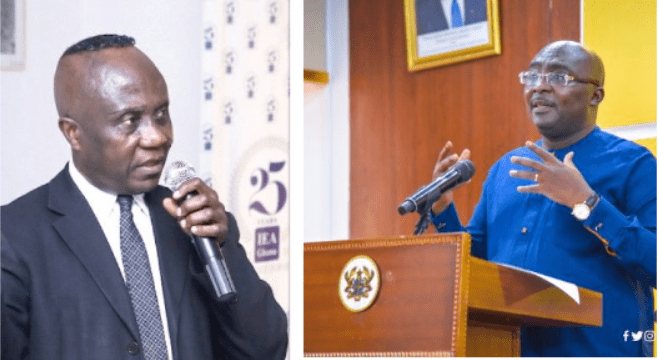The Director of Research at the Institute of Economic Affairs (IEA), Dr John Kwakye, who worked at the Bank of Ghana (BoG) for over twenty years, has said that his training on central bank operations did not teach him that the BoG should cross its limit in advancing huge money to the government in times of crisis to save the economy from collapse.
Dr Kwakye stated that there was a reason why the Bank of Ghana Act put a limit to how much the central bank could advance to the government.
“We know that the most inflationary source of financing the budget is when the central bank steps in to do it, that is what we call effectively, money printing, it is the most currency-destabilizing way of doing it but their argument was that the economy was in crisis, Ghana had been locked out of the international capital market and so there was no other way out and the BoG had to step in to save the economy from collapse, well my central bank training didn’t teach me that,” he said.
“The BoG act there is a reason why they put a limit because that source is destabilizing. but even if because of an emergency you are to go beyond that limit, if you have gone to 10 er cents of even 15 percent I would have said that may not be too grievous but by my own calculation, it was over 50 percent of last year’s revenue that they advanced to government. to me that is excessive,” he said on the Ghana Tonight Show on TV3 Monday Febraury 12 while reacting to the address delivered by Vice President Dr Mahamudu Bawumia on Wednesday Febraury 7.
Dr. Bawumia strongly defended the BoG during his address at the University of Professional Studies, Accra (UPSA) last Wednesday, February 7 for heavily monetising the fiscal deficit, especially in 2022.
Dr. Bawumia commended the central bank for saving the economy from collapse at a time when Ghana had lost access to international capital markets.
He indicated BoG’s action was responsible and that it was temporary as the Bank had advanced money to Government in only two of the past seven years.
“The Bank of Ghana provided needed financing to the government at a critical moment. What the BoG did was very responsible in putting the interest iof the citizens first,” he said.
However, Dr John Kwakye, in an earlier statement told Dr Bawumia that it is not the fact that the Bank of Ghana advanced money to the government during the economic crisis that is the issue because the Bank’s Act provides for such advances up to 5% of the previous year’s revenue.
He said it is rather the magnitude of the advance— over 50% of the previous year’s revenue—that is disturbing.
Dr Kwakye noted that the Minister of Finance had expressed similar sentiments in the past, which was not surprising because Government was the direct beneficiary of the monetary financing.
“However, as central bankers, we know that the most inflationary source of financing the budget is high-powered money coming directly from the central bank vault. It is not the fact that BoG advanced money to Government that is the issue, for the Bank’s Act provides for such advances up to 5% of the previous year’s revenue.
“It is the magnitude of the advance— over 50% of the previous year’s revenue—that is disturbing. It is no wonder inflation peaked at 54.1% in 2022—and depreciation ballooned to 54.2% in November 2022, before falling bank to 30.0% in December 2022,” he said.
“Meanwhile, as Government debt to BoG was also discounted under the DDEP, the Bank made a whopping loss of GHS61 billion and a record negative equity of GHS54 billion in 2022. Both the Minister and the Governor seem to have played down the loss as only a ‘technical loss.’
“However, the fact is that the Bank’s balance sheet has been severely impacted, and this would force it to cut back on some of its important operations so as to save costs,” he said in a write-up,” he added.


